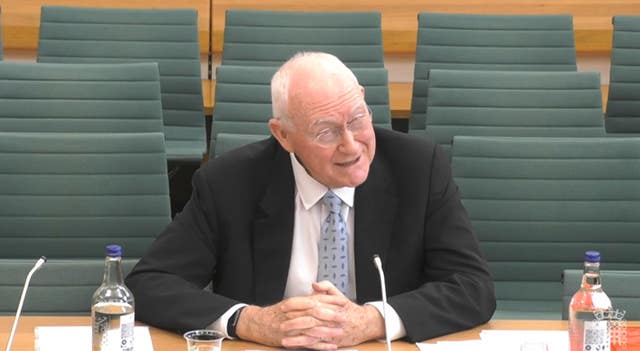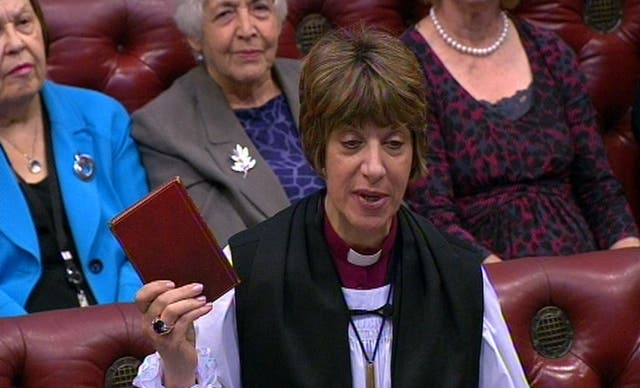Bishops in the Lords are a ‘feudal legacy’, says ex-BBC boss demanding reform
Lord Birt branded the automatic right for 26 Anglican bishops to sit on the red benches an ‘indefensible undemocratic anomaly’.

Anglican bishops sitting in the Lords are a “feudal legacy” that should be ousted along with hereditary peers, a former director-general of the BBC has said.
Independent crossbench peer Lord Birt branded the automatic right for 26 Lords Spiritual to sit on the red benches an “indefensible undemocratic anomaly”.
He urged the Government to consider addressing this as it works to reform the upper chamber, expressing “disappointment” at the lack of a “comprehensive, holistic and long-overdue approach” to modernising the Lords.

“The guaranteed representation of the Church of England in this House is a second feudal legacy, embedded centuries before the notion of democracy gathered pace.”
He argued that there are “very fundamental reasons why embedding representatives of a single church in this house is no longer appropriate”.
Lord Birt cited the 2021 census, in which less than half the population identified as Christian, and of those who identify as Christian, only 21% said that they are Anglican.
The former BBC boss said: “The reality is that we are now an incredibly diverse society, a society comprised of people embracing many faiths and none.
“And we should not embark on a long overdue radical reform of this House without recognising that fact and without recognising that embedding the Church of England in our legislature is an indefensible undemocratic anomaly…
“I would hope and expect to see faith leaders of every kind represented in a reformed House, but appointed on individual merit, not as exercising a right existing in one form or another for half a millennium.”
He also took the opportunity to criticise the Church’s ongoing decision not to allow its clergy to enter into a gay marriage, branding this a “shocking, unholy, indefensible anomaly”.
Liberal Democrat Lord Scriven agreed with the crossbencher, telling peers: “Any serious proposals to reform the House of Lords must address the unjustified privilege of the state church bishops’ bench.”
He said: “After a century of decline in religious attendance in Britain, the claim that bishops or any other religious representatives speak for any significant constituency is unwarranted and does not hold up to scrutiny.
“Bishops do not have any special insight. The idea that bishops or any other religious leader have a monopoly on issues of morality is offensive to many non-religious citizens.”
Labour former Cabinet minister Lord Murphy of Torfaen said he “couldn’t agree less” with critics of the bishops’ place in the Lords, arguing that their contributions are “first class” and that they “bring a perspective which is different”.
The peer, who is Catholic, added: “I believe it is right to bring a Christian perspective to this House.”
The Leader of the Lords, Baroness Smith of Basildon, said of the bishops: “I think we should be proud of the contribution they make.”
Their comments came as peers in Westminster debated the Lords Spiritual (Women) Act 2015 (Extension) Bill.
This Bill extends an existing policy of filling any vacancies that appear on the bishops’ benches in the House of Lords with female bishops to try and achieve a better gender balance.

The remaining 21 positions were filled by the longest-serving diocesan bishops in the Church.
After women were granted the right to serve as bishops in the Church of England in 2014, legislation was passed the following year to give priority to female bishops over longer-serving men to reflect that they have not had the opportunity to serve for a long period.
This arrangement was originally meant to last 10 years up to 2025, after which it would revert back to the 1878 terms, but is now set to be extended by five years, up to 2030.
This Bill to extend the time period was put forward at the request of the Church of England, because women still only hold six out of the 26 Lords Spiritual places in the chamber.
The Bishop of St Albans, the Rt Rev Alan Smith, who is the Convenor of the Lords Spiritual, said: “It is prudent to confess that we in the church have made slower progress than we had hoped when it came to ensuring that our senior clergy are representative of the diverse congregations that we serve.
“This is true both of women and of racial and ethnic minorities. We do not yet have proportional representation of female bishops on these benches or in our diocesan bishops.
“Were the provisions in the act to come to an end next year, as was the original plan, we would not, I fear, have achieved our goal of corrective action when it comes to the long delays to women’s ministry and appointments to senior positions in the Church of England…
“I personally strongly hope to see in five years time a proportional number of our female colleagues in post as diocesan bishops and in the pipeline for vacancies in the House and the usual rules of the 1878 Act to resume.”
The Bishop of Derby, the Rt Rev Libby Lane, said: “It is for Parliament to decide whether and in what capacity we continue to serve here.
“For my part, I recognise the privilege it is to occupy this space and will continue to do so to the best of my ability in and beyond this chamber as long as I am summoned.”





